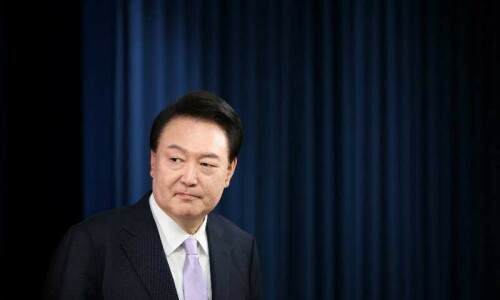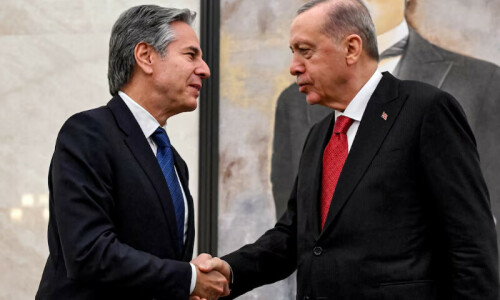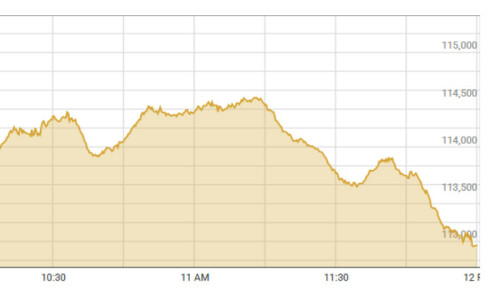LAHORE: Iranian-American author, scholar and activist Reza Aslan says that the twentieth century, supposed to be time of secularism and nationalism with the expectation that religion would fade away and wars would end, turned out to be the bloodiest in human history with the wars being fought not in the name of religion but in the name of secularism, socialism and communism, claiming millions of lives.
“With the failure of secular nationalism and communism, something had to take their place and religious identity was the option,” said Aslan while contextualising the rise of religious nationalism during a talk on, Religion and Identity Today, with historian Aliya Iqbal Naqvi from the IBA Karachi in the online series of Afkar-e-Taza ThinkFest on Thursday.
In a wide-ranging talk, Aslan touched upon several trends in religion and identity and also its political and social ramifications in the world today.
He clarified ‘religion’ and ‘faith,’ though interrelated, were separate things.
Talk on ‘Religion and Identity Today’ held in Afkar-i-Taza online series
“While faith is personal and spiritual, religion is outward and definitive and espouses an identity. It is this instrumentalisation of religion, which is creating conflict,” he argued.
“Faith is now being defined as religion,” Ms Naqvi pointed out, underscoring how the ‘spectrum of belief and practices within religions,’ was being curtailed, with the result that the people were no longer allowed to doubt or ask questions within their community.
Aslan emphasised that in today’s world we needed to learn the ‘language of faith, which is religion’ and communicate with each other through it. He deemed it critical for the people to know about other religions as that was the only way to not only educate oneself but also communicate with others. He said there was no ‘excuse’ not to be educated about other religions in the contemporary world.
“In the past, there was no choice. People believed what they were told by their local religious leaders. But now the whole world is open to them,” he noted.
Responding to Aliya Naqvi’s point that the Internet and new media had created more ‘silos and echo chambers,’ Aslan acknowledged the difficulty in learning but still maintained that at least the choice was there, which was not previously the case. He pointed out how people were usually ignorant of their own faith, let alone any other religion.
Giving the example of several classes he teaches, Aslan noted that most of his students, including the Muslims, were usually the most ignorant about their own faith.
‘Religious literacy is critical for the world today,’ he argued.
Reza Aslan argued that radical individualism and a closed and narrow communal identity were causing conflict in the world today.
Calling fundamentalism as ‘essentially modern’ in its outlook, Aslan emphasised that it was a reactionary phenomenon to opening up and globalisation and that the people need to see what it was reacting against.
Speaking on the negative reaction to his series ‘Believers’ from the Hindu American Foundation, he noted that it was due to their funders who were pro-BJP and right wing. He stated his television series was applauded by several members of the foundation and it was only after their BJP-linked funders were unhappy that they started a campaign against him.
“I have emails to prove how much they supported the show,” he noted.
Talking specifically on India, Aslan lamented the direction the country was taking. “I am not optimistic with what’s happening in India. In 10 years, India will be like Israel, with more authoritarianism and fascism,” he argued.
Aslan said there were no black and white Hindu and Muslim categories and identities, which became the basis of the Partition. “There is no such thing as Hindusim. It was coined by the British.” Noting the definition of India as a Hindu nation, Aslan emphasised that the Hinduism the BJP was promoting was a colonial construct.
‘There is no such thing as a Hindu religion.
The BJP has surrendered to the simplistic colonial construct where they lumped together a wide variety of practices as Hinduism,” he maintained.
On BJP rule in India Aslan said: ‘India is not on a good path and it will be very difficult for it to get to a positive path.’ On the question of the recent recognition of Israel by the UAE, Mr Aslan pointed out that the two states had already had economic and political relations and so the news was not new.
However, he added, “this deal does not mean anything for the Palestinians”.
Speaking on Iran, he criticised the US policy towards the country and said that it was wrong for US President Trump to pull out of the nuclear deal.
“We need to stop isolating Iran,” he retorted.
“The more we cut off Iran, the harder it will be to bring about a change in the country,” he exclaimed.
Commenting on Turkish President Erdogan’s recent conversion of the Hagia Sophia and Chora churches into mosques, Aslan reminded the audience that Erdogan’s rise was premised on a certain understanding of religious identity. In achieving political power, Erdogan was supported by the Gullen movement, but, once in power, he turned against them.
“Erdogan is promoting a very particular nationalistic religious identity, which is creating further divisions in Turkish society.” Taking the example of the United States, Aslan said, ‘when over 200 years ago, the Americans separated religion from state, it was to protect religion, not the state. “The state always defiles religion,” he exclaimed, emphasising the need for separation of the two for the good of religion itself.
Focusing on US President Trump and the upcoming US elections, Reza Aslan noted that the ‘white Evangelicals’ were supporting Trump.
“Over two-thirds of non-White Evangelicals voted for Hillary in 2016,” he pointed out.
Thus, it was not that ‘all evangelical’s’ supported Trump but that the ‘white’ ones did, exhibiting a clear racist streak in this support.
Aslan also argued that together with sheer racism the main reason White Evangelicals supported Trump was that they had lost the ‘culture wars’ of the last century, and so in Trump they saw a way of getting back to power.
Published in Dawn, August 28th, 2020













































Dear visitor, the comments section is undergoing an overhaul and will return soon.